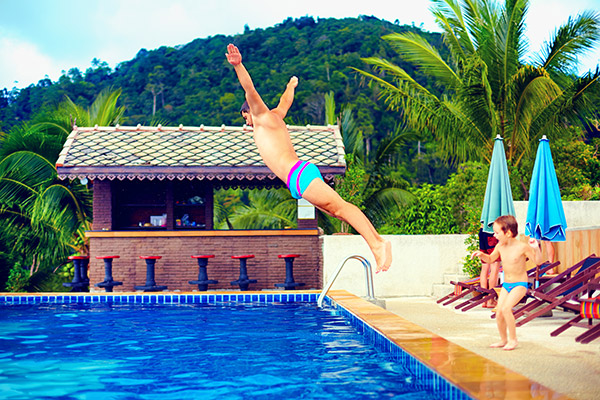Do kids holiday better than adults? The young ones featured in our recent video definitely think so! Check it out here if you haven’t seen it already:
Francesca Harvey, a Sydney Psychologist specialising in Family Therapy, shares her top eight insights with us on what we can we learn from kids on holiday, and how can this benefit us as adults:
1. Be present in the moment
Being present describes mindfulness, a technique derived from Buddhist meditation, that trains the mind to disregard the incessant chatter of our inner voice and just concentrate on our current place in space and time. This allows us to appreciate and connect to the present moment not worrying about the future or ruminating about the past. Recent research* showed parents may not be properly “in the moment” on holidays, with 32% saying they’re focused on getting the perfect holiday snap, compared to a much lower 19% of kids. Mindfulness has proven to increase mental health and wellbeing by reducing stress.
2. To be connected
With the disruption to daily routine and taking a break from usual activities (e.g. work, school, activities) we spend more time together as a family. We learn about relationships, connecting, getting along with others, and sharing. In this space we are able to connect with each other and respond to each other without distractions. This strengthens family relationships helping children value positive relationships making it more likely they will seek out positive relational experiences later in life. We can teach our children valuable life lessons through connection and play (communication, taking turns, positive emotions). We call this “Playful parenting.”
The chemical Dopamine is released in the brain when we experience something positive. Dopamine is the neurotransmitter responsible for our drive and reward system.
3. To communicate
Communication can also be non-verbal; through body language, gestures, facial expressions. The more we use various digital platforms the more we lose genuine communication skills. By taking away our screen time and replacing it with face-to-face communication, our kids learn to be effective communicators through our interactions and role modelling. Have some holiday rules and boundaries around electronic usage.
4. To not sweat the small stuff
While 63% of parents feel anxiety ahead of holidays, related to holiday cost (37%) and worries about their kids getting bored (12%), research findings show that kids love the simple pleasures on holiday, like sleeping in or sleeping in a different bed. This shows that it’s not worth sweating the small stuff on holidays. Don’t argue about wet towels on the floor or unwashed dishes in the sink if it will create tension that will resonate throughout the day. Relax the normal home rules such as meal times, bedtime, foods eaten.
5. Have positive feelings about the holiday
Research indicated that 9 in 10 kids have huge excitement levels about the anticipation of the coming holidays. Adults tend to focus more on negative possibilities such as financial costs or bad weather. Parents need to relax more leading up to the holiday and include children in the planning process such as activities, restaurant bookings and games to pack.
6. Be creative, be spontaneous
Think outside the box. Leave some unstructured time to discover and fully engage with the holiday location. Check out what’s on locally, a festival? A concert? A marketplace? Don’t forget to have fun as a family. Children don’t think twice about jumping into the cold pool or riding the big rollercoaster!
7. Take risks, have fun!
Adults need to engage in physical activity with kids. Impress the kids and rediscover the good feelings that come from increased energy levels, dopamine surges and feeling younger again. Reconnect with your younger self.
8. Let go of rigid structures and routine
This is a similar point to not sweating the small stuff. It is important for there to be a break in the routine, for parents as well as kids. Relaxed, more permissive parenting engages the kids and parents alike. It gives the parents a break from being the eternally vigilant caregivers and allows kids to see the human being behind the parent figure. Laugh, play, relax and connect.
*Lonergan Research surveyed 1,040 Australians (including 520 parents*, 18+ of young children and 520 of their kids aged 5-12*) who have been on a holiday away from home in the last 5 years. Surveys were distributed throughout Australia including both capital city and non-capital city areas. The survey was conducted online amongst members of a permission-based panel, between 18th and 26th August 2016. After interviewing, data was weighted to the latest population estimates sourced from the Australian Bureau of Statistics.
